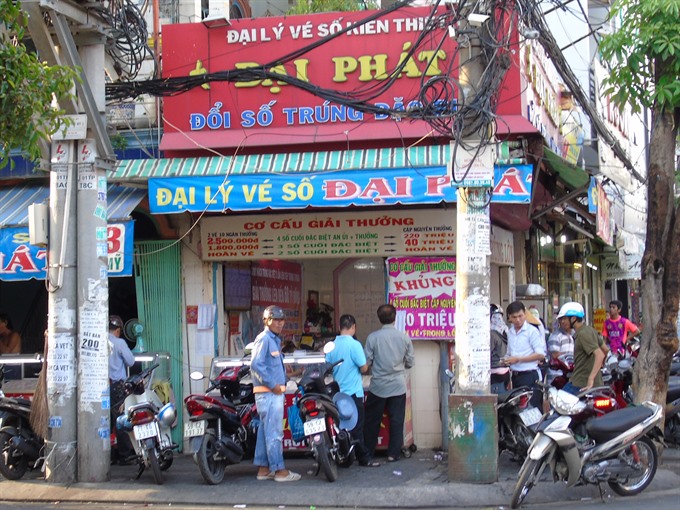 Economy
Economy

Since its launch last July the American-style computerised lottery Mega 6/45 has been rapidly becoming popular due to its large prizes.
 |
| Traditional lottery companies in the south have recently hiked their top prize to compete with Vietlott. –VNS Photo Anh Vũ |
By Hoàng Nguyên
HCM CITY – Since its launch last July the American-style computerised lottery Mega 6/45 has been rapidly becoming popular in Việt Nam due to its large prizes.
It is organised by the Ministry of Finance’s Việt Nam Computerised Lottery One-member Limited Liability Company (Vietlott) in collaboration with Malaysia’s Berjaya Bhd under a 18-year business co-operation contract.
After Vietlott announced its first jackpot winner, a pork seller in Trà Vinh Province who won VNĐ92 billion (US$4.03 million) last October, its lottery ticket sales surged from VNĐ2.12 billion ($93,492) a day to VNĐ11.2 billion ($493,920) within two months.
By December it was selling tickets worth VNĐ14.2 billion daily.
Vietlott’s rapid ascent has not been good news for traditional lottery companies in the southern region, the country’s main market.
At a meeting in January in the Mekong (Cửu Long) Delta province of Sóc Trăng, many members of the Southern Lottery Council blamed Vietlott’s violations of rules for hurting their sales in the last quarter of last year.
In that quarter the average revenue of the remaining 21 members declined by 4.36 per cent though their full-year sales rose by 8 per cent to nearly VNĐ66.7 trillion ($2.9 billion).
Vietlott grossed VNĐ1.6 trillion overall, and VNĐ1.3 trillion in the south.
Speaking at a seminar titled Transparency in the Lottery Market organised by Thanh Niên (Young People) newspaper last week, Dr Bùi Quang Tín, a lecturer at the Banking University of HCM City, said, “Though Vietlott’s business activity is growing rapidly, it has not affected the traditional lottery’s market share.”
In fact, Vietlott helped vary the market, encouraging the traditional lottery companies to change their business strategies and offer the public new products, he added.
Dr Đinh Thế Hiển, an independent economist, agreed, saying Vietlott was not a threat to the traditional companies, at least for now.
He rejected the idea that Vietlott created unfair competition by offering high-value prizes, saying each type of lottery has its own uniqueness.
Besides, the odds of hitting the jackpot are quite slim, of about one in eight million, compared to the one in one million for traditional lotteries.
In a market economy competition is fierce, but it encourages companies to offer customers more choices, change the way they interact with customers and improve the quality of products, he said.
To boost their sales, traditional companies in the south have recently raised their top prize from VNĐ1.5 billion to VNĐ2 billion.
Some lottery companies have even started selling tickets where buyers can write their own numbers instead of buying pre-printed numbers.
According to Hiển, instead of competing to dominate the market, traditional lottery companies and Vietlott should compete but also co-operate to create a win-win situation.
They could set up agencies that sell both Mega and their own tickets or develop new products to offer customers more choices, he said.
A lucrative business
Computerised lottery, where the number is not printed on the tickets and buyers can enter their own, was first introduced in the US in 1975.
It has since spread world-wide. Cambodia has been having these lotteries since 2003.
The Vietnamese Government had wanted to modernise the lottery set-up in 1997, but it took until last year for that to happen with Vietlott’s entry.
With estimated sales of around VNĐ75 trillion ($3.3 billion) last year, the lottery industry is very lucrative despite fierce competition, experts said.
Nguyễn Thanh Đạm, deputy general director of Vietlott, said the “world is flat” now, and some of his friends in Việt Nam buy lottery tickets in the US through friends and relatives.
If more Vietnamese turn to the US or neighbour Cambodia to buy lottery tickets if their demand is not met here, the country would see the money flowing out, he said. —VNS




